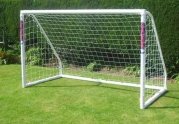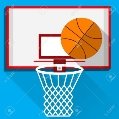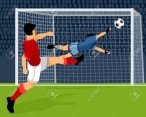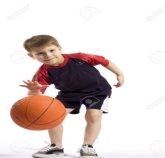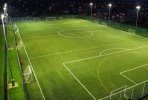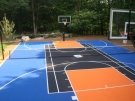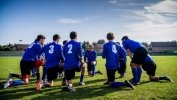Урок розвитку навичок слухання за темою "Sports" у 4 класі
Lesson plan
Information about the class
|
There are 5 pupils in this class, one boy and four girls. They are 9 years old. Two students are strong and feel confident in speaking and listening. One student has come this year; he is weak and needs a lot of support and correction. One learner is very shy. All pupils like working in pairs and groups very much. |
Lesson aims
|
To develop pupils’ listening. To develop children’s speaking skills. To activate learners’ vocabulary on the topic Sports To give pupils controlled and fluency practice on the topic. |
Rationale
|
For the half of this class listening is a challenge and I understand that I have to develop it. These pupils find listening difficult and they need as much practice as possible. I’ve chosen this listening because it is in the children’s coursebook . My pupils do different kinds of sport, so this topic might be interesting for them and it will help me develop pupils’ listening and speaking skills. |
Language analysis (
|
Form |
Meaning |
Pronunciation |
|
Vocabulary: score a goal
field
court
race
basket
bounce
net
|
to get a point
an area, usually covered with grass, used for playing sports
an area drawn out on the ground that is used for playing sports such as tennis and basketball
a competition in which all the competitors try to be the fastest and to finish first.
an open net hanging from a metal ring through which the players try to throw the ball to score points for their team
move up or away after hitting a surface
a rectangular piece of material made from string, used to separate the two sides in various sports. |
/skɔːr ə ɡəʊl/
/fiːld/
/kɔːt/
/reɪs/
/ˈbɑː.skɪt/
/baʊns/
/net/ |
Materials (referenced)
|
Naomi Simmons (2014)Family and Friends 4 2nd edition Class book,p.37 flash cards handouts recording |
Assumptions
|
My pupils learnt the topic Sports a month ago. They have learnt names of sports; they divided sports into individual, team kinds of sport and sports where there is a ball, into outdoor and indoor kinds of sport. They are familiar with collocations go/play/do with sports. They talked on this topic using these collocations. The students liked the topic very much, they are interested in sports, many of them visit different sport clubs, so it might help them to understand the recording and talk on the topic. |
|
Anticipated difficulties |
Solutions |
|
Weaker students might misunderstand the instructions from the first time. |
Check their understanding by ICQs, explain the task clearly. |
|
Strong pupils can be very quick. They can finish the tasks first . |
Prepare additional tasks. |
|
Two weak pupils will not work together effectively |
Organise them into different pairs |
|
Pupils might want to use Ukrainian |
Encourage pupils to speak English. |
|
The computer might not work. |
Read the text myself. |
|
Difficult tasks |
Make them easier |
|
Easy tasks |
Make them more challenging |
Board Plan
|
judo
basketball
Rosy
football
Kareem
Harry
gymnastics
Sara |
|
Stage |
Stage aim |
Procedure |
Interaction |
Time |
|
Warm-up |
To get learners’ attention and to get them interested in the topic |
Greet pupils. Say that the topic of our lesson is SPORT and ask pupils if they like sport, what sport they do, when they do it and what sport they do at school. |
Whole class
|
2 min |
|
Pre-listening task |
to activate learners’ vocabulary and get the learners interested in the topic |
Ask pupils to remember as many kinds of sports as they can. Divide pupils into 2 teams and ask them to write as many words as they remember. Check learners’ understanding by ICQs. Monitor children and control if weak pupils work .Check words and decide which team is the winner. Say that we are going to listen to the audio where children are talking about their favourite kinds of sport. Show children four photos of children and ask them to predict their names and favourite sports (Appendix 2) .Children will predict (In my opinion, Rosy is number 4.I think Kareem’s favourite sport is volleyball). Say pupils that children in the task will not say names of their favourite sports, they will say riddles and we will have to solve them, that that’s why we will prepare for this, we will practise, solve some riddles. Divide pupils into pairs and give them riddles. Give the instruction to solve them one by one and get points for right answers. Explain that the right answers for checking their answers will be on the back. Check learners’ understanding by ICQs. Monitor pupils during their work for supporting and help. Decide who winners are. |
Groups Pair work |
10 min |
|
Pre-teach vocabulary |
To help learners understand the text |
Say that in our text we will hear new words(Appendix 3).Show pictures of these words on the board and pronounce them(score a goal, field, court, race, basket, bounce, net). Encourage pupils to pronounce new words after showing each picture, correct incorrect pronunciation .Check children’s understanding by CCQs. Remove words from the board and leave only flashcards. Ask children to match words with cards. Then ask one child to remove one flashcard from the board, other learners will guess what picture is missing. Do it with all words. |
Whole class |
10 min |
|
First while-listening task |
To help learners understand key ideas |
Ask children to listen to the text and match a child with her or his name and write their favourite sport (Appendix 1.Task 1) For weaker pupils there will be the example and there will be two kinds of sport for choosing below every child. Check learners’ understanding by ICQs. After first listening children will check their answers in pairs, then we will check together. |
Individually Pair work |
6 min |
|
Second while-listening task |
To help learners understand more detail |
Say children to listen to the audio again and fill the gaps (Appendix 1.Task 2).For stronger pupils there will be one box with words for the whole task. For weaker pupils the task will be divided into four parts (every part for different child from listening) and there will be one box with words for every section. Check learners’ understanding by ICQs. Children will listen and check their answers in pairs. Then check the task together. |
Individually Pair work |
7 min |
|
Post-listening task |
To develop learners’ speaking skills |
Divide children into pairs. Give them dialogues. Children will have to talk about sport that they do and also where and when they do it. Weaker pupils will have some prompts in the brackets for answering (Appendix 4). Two students will read the dialogue and add their information as the example for others. Pupils will work. Monitor pupils‘ language for eliciting good language and mistakes during their speaking. Reorganise pairs and ask pupils to talk without the pattern. Monitor pupils‘ language for eliciting good language and mistakes during their speaking again. Ask volunteers to show their dialogues for the whole class.
|
Pair work |
10 min |
|
Feedback |
To analyse pupils’ language
|
Thank learners for good work. Do a summary of a lesson. Connect language that was used during the lesson with children’s life. Use the board to show some examples of good language that was used. Write some sentences with mistakes on the board and ask my students to correct them. Praise my students for good job. |
Whole class |
5 min |
Appendix 1
The page from the book
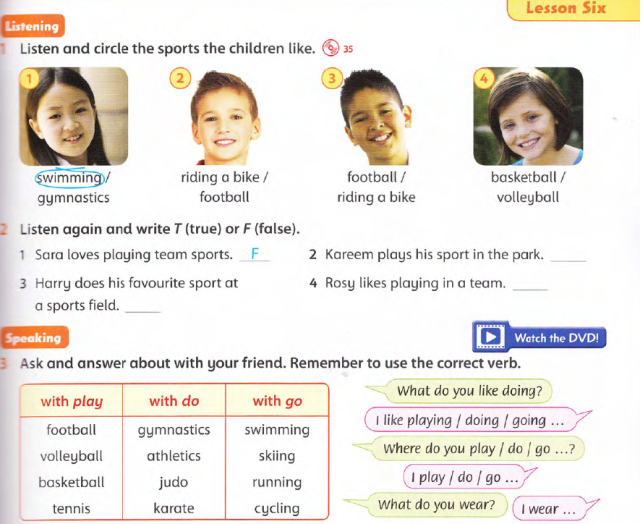
Appendix 2
Task 1(for stronger learners)
Match the name with the photo and write what her/his favourite sport is.
Rosy 
__________
Kareem 
__________
Harry 
__________
Sara 
Task 2 (for stronger learners)
|
team water pool baskets bounce field fastest court sports ride friends |

- I don’t like __________sports.
- I go to the _____________.
- I jump in the______________.
________________________________________________
-
 I love _______________.
I love _______________.
- We play in the sports ______________.
- We kick the ball into the___________.
__________________________________________________
-
 I do like going out with my______________.
I do like going out with my______________.
- We go to the sports fields and __________bikes very fast.
- Sometimes we have races to see who is the ________.
 ________________________________________________
________________________________________________
- We play on a _____________________.
- There are two ____________________.
- We ________________a ball.
Task 1(for weaker learners)
Match the name with the photo and write what her/his favourite sport is.
![]() Rosy
Rosy 
 gymnastics/
gymnastics/
Kareem 
judo /football
Harry 
riding a bike / skiing
Sara 
basketball/volleyball
Task 2(for weaker learners)
|
water team pool |

- I don’t like __________sports.
- I go to the _____________.
- I jump in the______________.
__________________________________________________
|
fields sports net |
-
 I love _______________.
I love _______________.
- We play on the sports ______________.
- We kick the ball into the___________.
____________________________________________________
|
ride fastest friends |
-
 I do like going out with my______________.
I do like going out with my______________.
- We go to the sports fields and __________bikes very fast.
- Sometimes we have races to see who is the ___________.
________________________________________________
|
court bounce baskets |
- We play on a _____________________.
- There are two ____________________.
- We ________________a ball.
Appendix 3

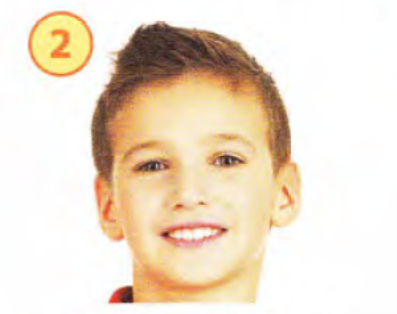
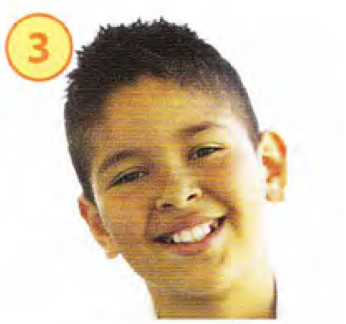
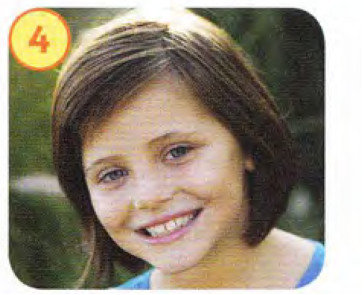
|
basketball |
|
volleyball |
|
football |
|
riding a bike |
|
swimming |
|
gymnastics |
|
athletics |
|
swimming |
|
judo |
|
skiing |
Appendix 4
|
score a goal |
|
field |
|
court |
|
race |
|
basket |
|
bounce |
|
net |
Appendix 5
|
People play this sport on the field. There are two nets in this sport. Players kick the ball into the net and score goals. |
When people do this sport they move their body and feet in time to music. |
|
There are two or four people in this sport. People play it on a court. They use rackets and a ball. |
People can do this sport inside or outside. When people do it they can sit or be in one position for a long time. |
|
People play this sport on the court. They have a ball. They have to bounce a ball and throw it into the basket. |
I this sport people fight using their hands, elbows, legs and feet. It is a Japanese sport. |
|
People do this sport at the gym. They stretch and do different exercises. |
People usually go to the pool to do this sport. It is an individual kind of sport.
|
Appendix 6 Dialogue(for weaker students)
|
What do you like doing?
|
|
I like …………………………………(swimming ,dancing, running, riding a bike, skating, skateboarding, rollerblading, doing gymnastics /karate /athletics /taekwondo /aerobics/yoga, playing volleyball /football/basketball/tennis)
|
|
Where do you play/do/go …………………………….?
|
|
I play/do/go …………………………………(at the sports club, at the sports centre, at the swimming pool, at the football field, at the roller rinks ,at the gym)
|
|
When do you play/do/go/…………………………..?
|
|
I play go/go/do ………………………………………….(every day,on Monday, at the weekend, in summer, in winter, when I have free time).
|
Dialogue(for stronger students)
|
What do you like doing?
|
|
I like …………………………………
|
|
Where do you play/do/go …………………………….?
|
|
I play/do/go …………………………………
|
|
When do you play/do/go/…………………………..?
|
|
I play go/go/do ………………………………………….
|
Appendix 7
Listening
-What do you like doing , Sara?
-I don’t really like team sports, but I do like exercises and I love water. What do I like doing? Well…I go to the pool, I put on my swimsuit and I jump into water. Can you guess what it is?
-What about you, Kareem? What do you like doing?
-I love sports. But what’s my favourite sport? Can you guess? We play on the sports field. There are two teams and there are two nets.
You play with one ball. You kick the ball into the net. The team which scores the most goals wins.
-Do you like sport, Harry? What do you like doing?
-I don’t like football and I don’t like swimming. But I do like going out with my friends. We go to the sports field and ride our bikes very fast. Sometimes we have races to see who is the fastest.
-And what about you ,Rosy?
-I like all team sports. My favourite is a game you play in two teams. We play on the court. There are two baskets. We bounce a ball. What’s my favourite sport?


про публікацію авторської розробки
Додати розробку











